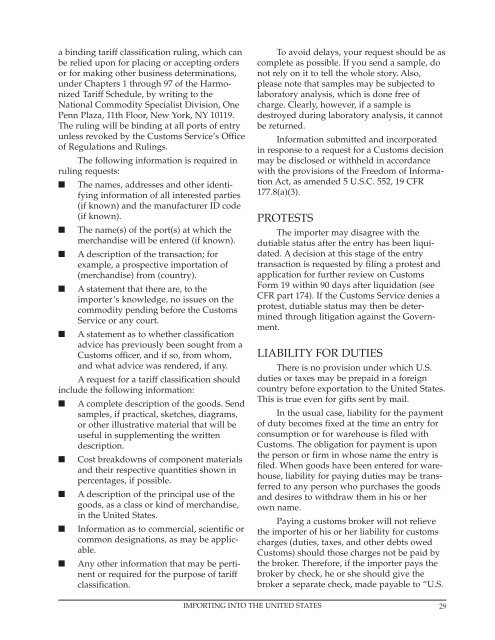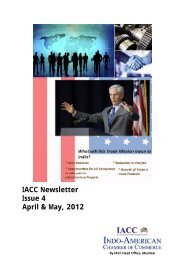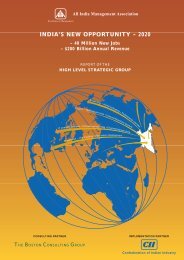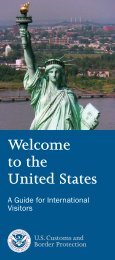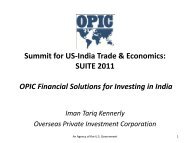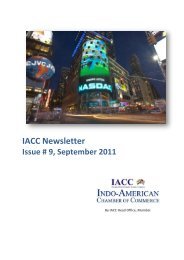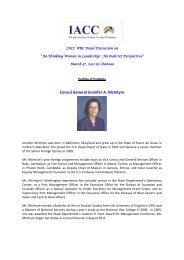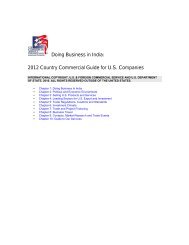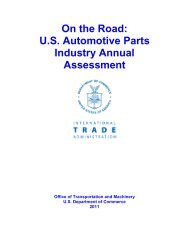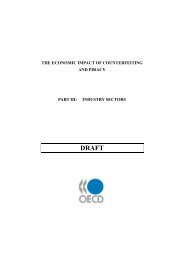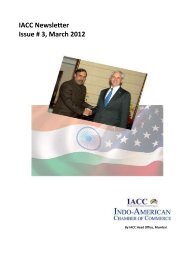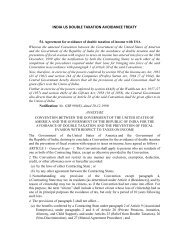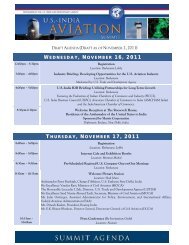Importing into the United States - Indo-American Chamber Of ...
Importing into the United States - Indo-American Chamber Of ...
Importing into the United States - Indo-American Chamber Of ...
Create successful ePaper yourself
Turn your PDF publications into a flip-book with our unique Google optimized e-Paper software.
a binding tariff classification ruling, which can<br />
be relied upon for placing or accepting orders<br />
or for making o<strong>the</strong>r business determinations,<br />
under Chapters 1 through 97 of <strong>the</strong> Harmonized<br />
Tariff Schedule, by writing to <strong>the</strong><br />
National Commodity Specialist Division, One<br />
Penn Plaza, 11th Floor, New York, NY 10119.<br />
The ruling will be binding at all ports of entry<br />
unless revoked by <strong>the</strong> Customs Service’s <strong>Of</strong>fice<br />
of Regulations and Rulings.<br />
The following information is required in<br />
ruling requests:<br />
■<br />
■<br />
■<br />
■<br />
The names, addresses and o<strong>the</strong>r identifying<br />
information of all interested parties<br />
(if known) and <strong>the</strong> manufacturer ID code<br />
(if known).<br />
The name(s) of <strong>the</strong> port(s) at which <strong>the</strong><br />
merchandise will be entered (if known).<br />
A description of <strong>the</strong> transaction; for<br />
example, a prospective importation of<br />
(merchandise) from (country).<br />
A statement that <strong>the</strong>re are, to <strong>the</strong><br />
importer’s knowledge, no issues on <strong>the</strong><br />
commodity pending before <strong>the</strong> Customs<br />
Service or any court.<br />
■ A statement as to whe<strong>the</strong>r classification<br />
advice has previously been sought from a<br />
Customs officer, and if so, from whom,<br />
and what advice was rendered, if any.<br />
Arequest for a tariff classification should<br />
include <strong>the</strong> following information:<br />
■<br />
■<br />
■<br />
■<br />
■<br />
A complete description of <strong>the</strong> goods. Send<br />
samples, if practical, sketches, diagrams,<br />
or o<strong>the</strong>r illustrative material that will be<br />
useful in supplementing <strong>the</strong> written<br />
description.<br />
Cost breakdowns of component materials<br />
and <strong>the</strong>ir respective quantities shown in<br />
percentages, if possible.<br />
A description of <strong>the</strong> principal use of <strong>the</strong><br />
goods, as a class or kind of merchandise,<br />
in <strong>the</strong> <strong>United</strong> <strong>States</strong>.<br />
Information as to commercial, scientific or<br />
common designations, as may be applicable.<br />
Any o<strong>the</strong>r information that may be pertinent<br />
or required for <strong>the</strong> purpose of tariff<br />
classification.<br />
To avoid delays, your request should be as<br />
complete as possible. If you send a sample, do<br />
not rely on it to tell <strong>the</strong> whole story. Also,<br />
please note that samples may be subjected to<br />
laboratory analysis, which is done free of<br />
charge. Clearly, however, if a sample is<br />
destroyed during laboratory analysis, it cannot<br />
be returned.<br />
Information submitted and incorporated<br />
in response to a request for a Customs decision<br />
may be disclosed or withheld in accordance<br />
with <strong>the</strong> provisions of <strong>the</strong> Freedom of Information<br />
Act, as amended 5 U.S.C. 552, 19 CFR<br />
177.8(a)(3).<br />
PROTESTS<br />
The importer may disagree with <strong>the</strong><br />
dutiable status after <strong>the</strong> entry has been liquidated.<br />
A decision at this stage of <strong>the</strong> entry<br />
transaction is requested by filing a protest and<br />
application for fur<strong>the</strong>r review on Customs<br />
Form 19 within 90 days after liquidation (see<br />
CFR part 174). If <strong>the</strong> Customs Service denies a<br />
protest, dutiable status may <strong>the</strong>n be determined<br />
through litigation against <strong>the</strong> Government.<br />
LIABILITY FOR DUTIES<br />
There is no provision under which U.S.<br />
duties or taxes may be prepaid in a foreign<br />
country before exportation to <strong>the</strong> <strong>United</strong> <strong>States</strong>.<br />
This is true even for gifts sent by mail.<br />
In <strong>the</strong> usual case, liability for <strong>the</strong> payment<br />
of duty becomes fixed at <strong>the</strong> time an entry for<br />
consumption or for warehouse is filed with<br />
Customs. The obligation for payment is upon<br />
<strong>the</strong> person or firm in whose name <strong>the</strong> entry is<br />
filed. When goods have been entered for warehouse,<br />
liability for paying duties may be transferred<br />
to any person who purchases <strong>the</strong> goods<br />
and desires to withdraw <strong>the</strong>m in his or her<br />
own name.<br />
Paying a customs broker will not relieve<br />
<strong>the</strong> importer of his or her liability for customs<br />
charges (duties, taxes, and o<strong>the</strong>r debts owed<br />
Customs) should those charges not be paid by<br />
<strong>the</strong> broker. Therefore, if <strong>the</strong> importer pays <strong>the</strong><br />
broker by check, he or she should give <strong>the</strong><br />
broker a separate check, made payable to “U.S.<br />
IMPORTING INTO THE UNITED STATES<br />
29


